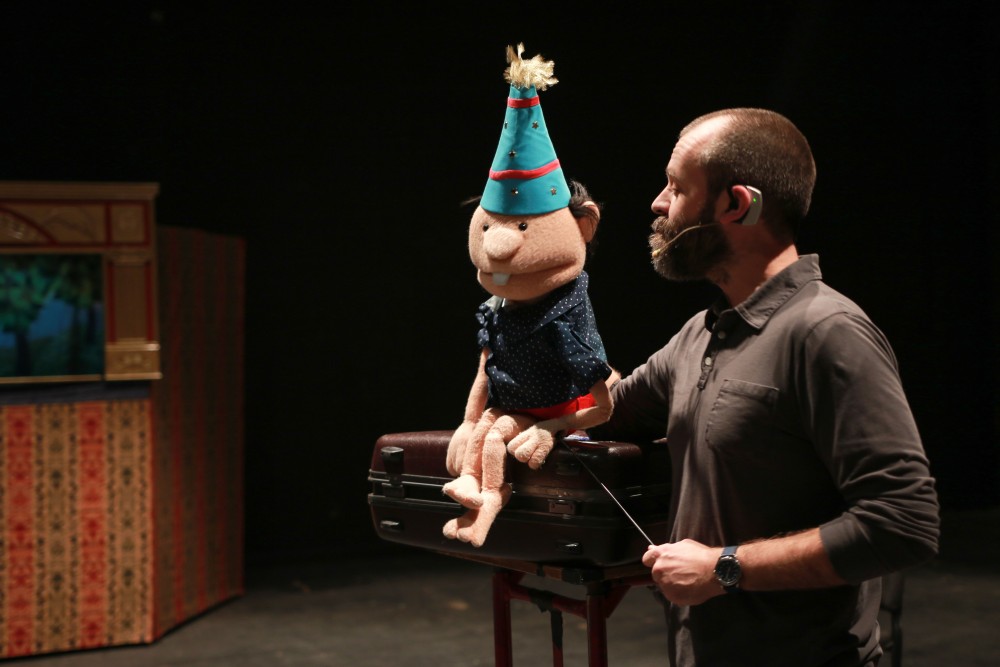Puppetry workshop broadens theater experience

GVL / Sara Carte – Local puppeteer of Grand Rapids, Kevin Kammeraad, performs with his puppet Jacob during the puppet show workshop in the Louis Armstrong Theatre in the Perfroming Arts Center on Friday, Feb. 19, 2016.
Feb 22, 2016
Stumbling across a puppetry workshop and performance all in one week is a rare occurrence, but Grand Valley State University offered this unique art form as a teaching tool for theater and Spanish students to help them develop skills they can utilize in the future.
Justin Mackey, a theater major in his senior year at GVSU, said he gladly took this free opportunity to learn how create his own puppet as well as build a show from the ground up with a group of other theater students.
“I get to take the skills I’ve learned so far (in acting) and put it into a different instrument,” Mackey said.
The puppetry workshop lasted from Feb. 13-19 and the students who signed up gathered on the stage of the Louis Armstrong Theatre every evening to work on building their puppets and developing their show for a few hours. The students put on a free, public performance of the show they developed with their hand-crafted puppets on Feb. 20 in the Louis Armstrong Theatre. The puppets created by the students included: an old lady, a “basic” white girl, a chimpanzee, a snow leopard and a zombie.
Mackey said that even though he was hesitant to sign up for the workshop, he was grateful for the experience because he will know how to create and utilize a puppet if he needs to in his future career. He said that initially he associated puppets with being something for children, but after attending the first day of the workshop he learned that puppetry shows can be serious as well. The moment he realized this was after the workshop participants were shown a news article about a puppetry group in Spain that were arrested for one of their performances.
Puppetry is also used at GVSU to help Spanish students develop their speaking skills. Jason Yancey, an associate professor in the Spanish department at GVSU, teaches a Spanish puppetry class where students are required to build their own puppets and put on performances at elementary schools.
“I find that using the puppets helps students in Spanish hide a little bit,” Yancey said. “I describe the puppet as a stunt double or a crash test dummy. If someone conjugates the verb wrong (in Spanish) it’s not (their) fault, it’s the puppet’s fault.”
Yancey said the puppets receive all the criticism from the audience rather than the person controlling the puppet, and this helps students learning a new language build the confidence to speak in front of an audience. Yancey required his Spanish puppetry students to attend the performance on Feb. 20 and write a personal response to the show in Spanish.
Yancey believes that puppetry and theater overall have a personal, exciting aspect that isn’t present elsewhere. He said that students care about their puppets much more than they care about term papers they write for other courses. He has been contacted by past education students who have used their puppets from his class to teach students in their own classrooms.
James Bell, a theater history professor at GVSU, collaborated with Yancey to make the puppetry workshop and performance possible. Bell participated in the workshop and created a puppet version of himself. He said that historically puppets have been used as scapegoats and replacements for people in rituals where violence was inflicted on the puppets rather than the people to avoid real consequences.
“I think theater is still not a real world, but people are willing to buy into that world for a little while,” Bell said. “Humans aren’t robots ,and I think if you take arts away (they) become robotic kinds of people that don’t look at the consequences of decisions that can be made.”
Bell believes that puppetry and theater are both important teaching tools for all students because without arts and humanities courses, ethics wouldn’t be questioned and creativity would be lost.
“Science and math tries to look at the universe in a very organized, structured way—how things work,” Bell said. “But I think arts and humanities (capture) more of the sense of what it is to be a human being—not the nuts and bolts. (Arts and humanities teach) what it is that human beings experience beyond what is cellular.”





















